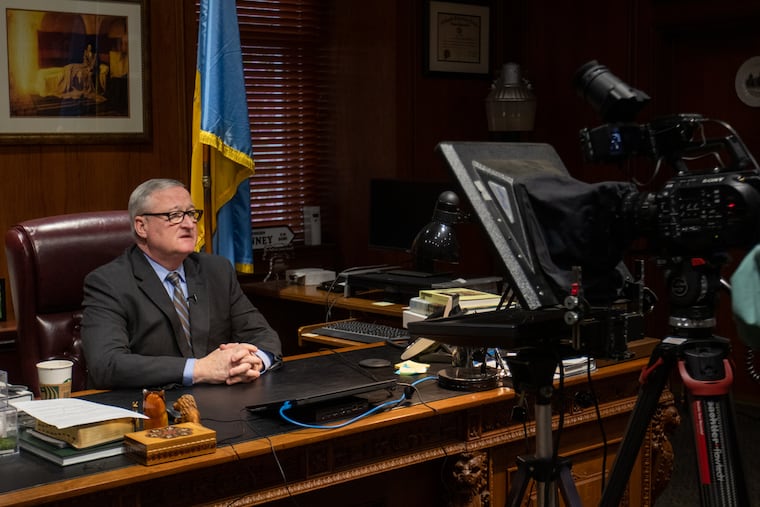Philly’s extremely ordinary budget for an extraordinary time | Editorial
Philadelphia had a chance to reimagine how the city functions thanks to the federal relief plan. Instead, Council will likely approve most of the mayor’s predictable budget.

The budget process in City Hall is entering its final phase, and perhaps the spending plan would have met the current extraordinary moment if our elected officials listened to a sixth grader. In an early May rally outside of the Philadelphia School District headquarters, Jordan Henry from Lingelbach Elementary took the microphone and told the crowd: “Normal was never enough.”
The pandemic challenged everything, from schools and health care, to transportation and libraries. And in the midst of that, the far-too-common crisis of police killing Black people came to a head in the murder of George Floyd and the resulting protests.
» READ MORE: Mayor Jim Kenney and City Council brace for ‘marathon’ negotiations to finalize Philly budget
These moments, spread out over a year of immense disruption, were a striking reminder that “returning to normal” should not be Philadelphia’s goal.
Mayor Jim Kenney doesn’t seem to view it that way.
For his April budget address, Kenney’s theme was the “eventual return to all that makes Philadelphia great.” His budget reflects this sentiment — that Philadelphia was on the right path, and the city will be positioned for success if we just get back there.
The Floyd protests and the pandemic-induced recession forced Philadelphia into tough debates about the role of police and how to ensure the city’s tax revenue base can sustain shocks. But the current conversation surrounding the budget feels as if it could be happening in 2019.
There is again debate over a rather marginal tax change. And Kenney again proposed slashing or low-balling the budgets of programs closely connected to specific councilmembers — Helen Gym’s Eviction Prevention Program, Maria Quiñones-Sánchez’s Housing Trust Fund, Cherelle Parker’s commercial corridor cleanup, Curtis Jones’ Citizens Police Oversight Commission, to name a few.
Philadelphia doesn’t have zero-based budgeting, in which a budget is built from scratch every year. Payroll, pensions, and other employee benefits, as well as contractual services, are locked in multiyear contracts, leaving the mayor and Council with only a few hundred million dollars to allocate from the more than $5 billion budget. That can create a heightened sense of scarcity, but that shouldn’t have been the case this year.
President Joe Biden’s American Rescue Plan provided Philadelphia a whopping $1.4 billion, which the city is planning on drawing on for the next four years — that is on top of direct federal funds for school reopening and other programs. In addition, with many services and programs not operating last year due to the pandemic, there was an opportunity for the city to assess which of those didn’t need to come back and invest even more in what works.
This year could have been different — and that’s exactly what makes this year’s budget process so frustrating. Philadelphia had an opportunity to do something bold and make one-time investments that would revolutionize some of the city’s most pressing issues.
» READ MORE: City Council should fight Kenney’s cuts to eviction prevention budget | Editorial
Just imagine: There are 5,000 people experiencing homelessness in Philadelphia. The Office of Homeless Services says that more than 80% of people who get rapid rehousing — one year of rent and supporting services — will not return to the street. Philadelphia could have rapidly rehoused every single person experiencing homelessness with $55 million. Instead, the mayor proposed a cut of $1 million to legal aid for low-income people facing eviction.
In Chicago, a 12- to 18-month program that combines jobs with cognitive behavioral therapy for people who are at the highest risk to shoot or be shot has shown tremendous success. The cost over that period of the program is $23,000. With $100 million from the relief windfall, Philadelphia could have had more than 4,000 people go through a similar program. Instead the city committed to $10 million over a period of five years to the model.
In all likelihood, aside from minor tinkering, Council will approve most of the mayor’s predictable budget. The final product, like the original proposal, will ignore the profound discussions about reimagining how the city functions.
Bringing Philly back to normal is bringing us back to continued gun violence, high rates of eviction and overdose death, and mass homelessness. It’s continuing to see our city make few gains in shaking our unwelcome titles of first in poverty and among the last in job growth. Instead of paving a new path forward, in response to an extraordinary year, the city will pass an extremely ordinary budget — and that was never enough.